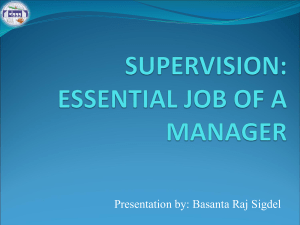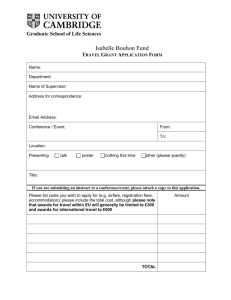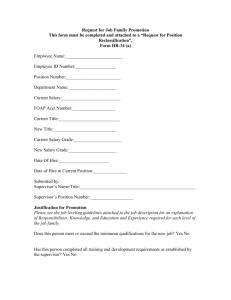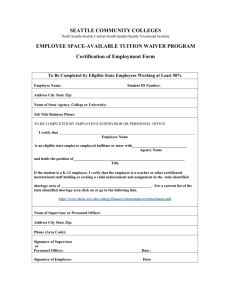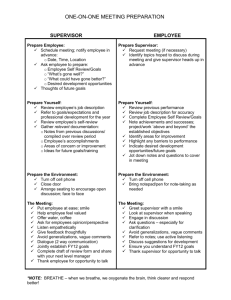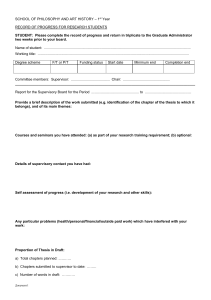Code of Practice on Supervision
advertisement
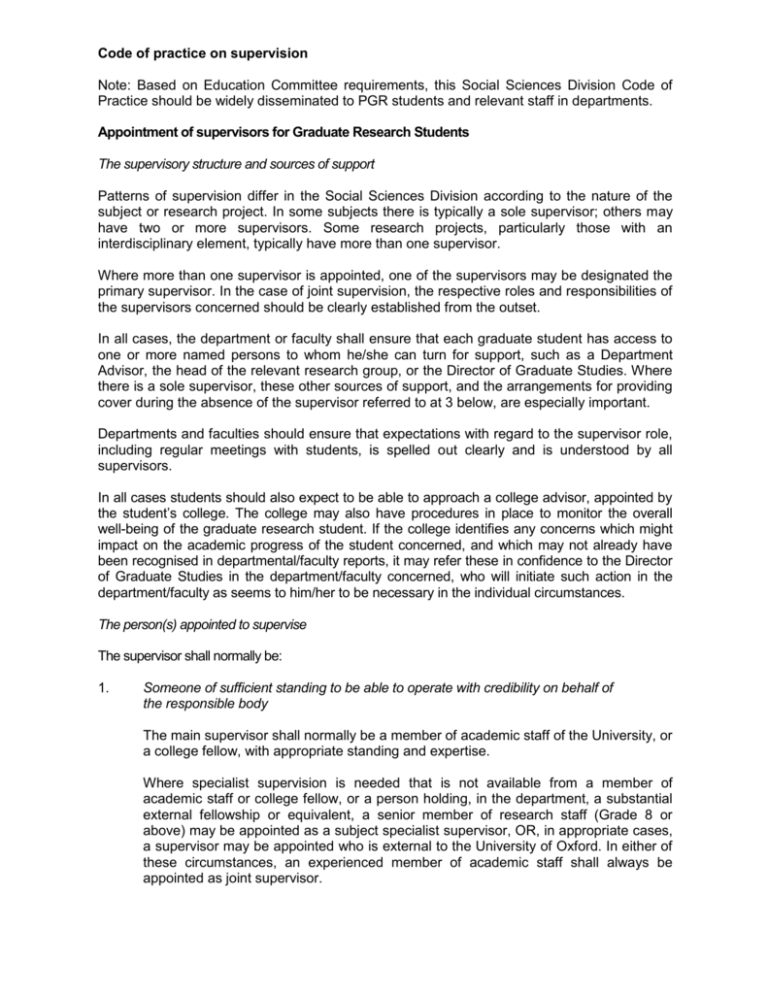
Code of practice on supervision Note: Based on Education Committee requirements, this Social Sciences Division Code of Practice should be widely disseminated to PGR students and relevant staff in departments. Appointment of supervisors for Graduate Research Students The supervisory structure and sources of support Patterns of supervision differ in the Social Sciences Division according to the nature of the subject or research project. In some subjects there is typically a sole supervisor; others may have two or more supervisors. Some research projects, particularly those with an interdisciplinary element, typically have more than one supervisor. Where more than one supervisor is appointed, one of the supervisors may be designated the primary supervisor. In the case of joint supervision, the respective roles and responsibilities of the supervisors concerned should be clearly established from the outset. In all cases, the department or faculty shall ensure that each graduate student has access to one or more named persons to whom he/she can turn for support, such as a Department Advisor, the head of the relevant research group, or the Director of Graduate Studies. Where there is a sole supervisor, these other sources of support, and the arrangements for providing cover during the absence of the supervisor referred to at 3 below, are especially important. Departments and faculties should ensure that expectations with regard to the supervisor role, including regular meetings with students, is spelled out clearly and is understood by all supervisors. In all cases students should also expect to be able to approach a college advisor, appointed by the student’s college. The college may also have procedures in place to monitor the overall well-being of the graduate research student. If the college identifies any concerns which might impact on the academic progress of the student concerned, and which may not already have been recognised in departmental/faculty reports, it may refer these in confidence to the Director of Graduate Studies in the department/faculty concerned, who will initiate such action in the department/faculty as seems to him/her to be necessary in the individual circumstances. The person(s) appointed to supervise The supervisor shall normally be: 1. Someone of sufficient standing to be able to operate with credibility on behalf of the responsible body The main supervisor shall normally be a member of academic staff of the University, or a college fellow, with appropriate standing and expertise. Where specialist supervision is needed that is not available from a member of academic staff or college fellow, or a person holding, in the department, a substantial external fellowship or equivalent, a senior member of research staff (Grade 8 or above) may be appointed as a subject specialist supervisor, OR, in appropriate cases, a supervisor may be appointed who is external to the University of Oxford. In either of these circumstances, an experienced member of academic staff shall always be appointed as joint supervisor. 2. Someone who has sufficient experience to be able to provide appropriate guidance to the student about the necessary procedures and, in particular, the academic expectations associated with an Oxford doctorate in their subject area. At least one supervisor will currently be engaged in research in the relevant discipline(s) or subject area so as to ensure that the direction and monitoring of the student’s progress is informed by up to date subject knowledge and research developments. Appropriate support and training will be given to new supervisors. Each new member of academic staff may take advantage of support in developing their teaching by arranging a one-to-one consultation with the Division’s Educational Development Adviser shortly after starting in Oxford. This consultation will provide an opportunity for individuals to explore their own professional development needs and what aspects of the educational development programme of the Oxford Learning Institute (OLI) might be of help. In addition, all appointees new to supervision are encouraged to use the extensive online materials on the Oxford Learning Institute’s Research Supervision Website http://www.learning.ox.ac.uk/supervision/ and to take part in the seminar on Supervising DPhil students http://www.learning.ox.ac.uk/seminars.php?page=3&cat=az available in Hilary Term. The Learning Institute can also provide a customised, Departmentspecific seminar on graduate supervision for groups of six more; two or more smaller Departments can combine if preferred. Further details are available from: kathryn.black@learning.ox.ac.uk. For members of academic staff in their first period of office, Departments will appoint an adviser who will, amongst his/her other duties, provide advice, support, and guidance on teaching, and supervision of research students. New academic staff will also have access to general support and advice from the Director(s) of Graduate Studies in their department/faculty. The supervision record of a new member of academic staff is included in the review prior to appointment to retiring age, and a high standard of supervision is expected. When a supervisor is not a member of academic staff at the University, or a fellow of an Oxford college, or with previous supervisory experience: an experienced member of academic staff will be appointed by the department either as a joint supervisor or, where this arrangement is not available or appropriate, as a designated advisor to the supervisor, and will be expected to act as mentor specifically to support research supervision; when the supervisor is a member of contract research staff, s/he will be expected to attend the OLI seminar. A candidate should not be admitted if there is no suitable specialist supervision available in the University or its colleges. 3. Someone who is able to undertake the tasks assigned to the supervisor in the Education Committee “Policy on Research Degrees” http://www.admin.ox.ac.uk/edc/policiesandguidance/policyonresearchdegrees/ including integrating them into the national and international network in their subject. In terms of academic standing and experience, this is dealt with above. Departments should put in place mechanisms to ensure that the quality of supervision is not put at risk as a result of the excessive volume and range of other duties assigned to individual supervisors. In respect of supervision of research students the norm is for university lecturers to supervise four students, and CUF and faculty lecturers three (notional maxima being eight and six respectively). These norms and notional maxima are based on sole supervision and, where staff are engaged in joint supervision, would be adjusted to reflect the level of commitment involved. The division typically expects a research student to have individual meetings with his/her supervisor for one hour not less than two to three times per term. However, the frequency may vary according to the stage of the research programme. It follows that, alongside his/her other duties, a supervisor should be able to provide this typical level of support for each of his/her research students. Departments shall make appropriate arrangements to cover for a supervisor’s absence on leave or for other reasons, and should ensure that students are not disadvantaged by the appointment as a supervisor of someone who is about to go on leave. Change of supervisor Where a student’s research changes focus such that their current supervisor may no longer be the most appropriate person to provide guidance on the revised topic, departments and faculties, in consultation with the supervisor concerned, should consider whether or not an additional or alternative supervisor should be appointed. It should be noted that such a change of research focus is unusual, and requires prior permission from the department or faculty concerned. Where a student feels that there are good grounds for contemplating a change of supervisor, this should first be discussed with the supervisor concerned, or if this seems difficult, with the appropriate head of department, Director of Graduate Studies or their deputies, or the college adviser (see section 4.1 of the Education Committee “Policy on Research Degrees”: http://www.admin.ox.ac.uk/edc/policiesandguidance/policyonresearchdegrees/). If this involves concerns over the quality of supervision, students should be encouraged to seek to resolve the matter by informal means where possible, but should be made aware of the University’s formal complaint procedures. The procedures adopted by the Proctors for the formal consideration of complaints and appeals are described in the Proctors and Assessor’s Memorandum http://www.admin.ox.ac.uk/proctors/info/pam/ and the relevant Council regulations http://www.admin.ox.ac.uk/statutes/regulations/. 4. Someone who has sufficient security of tenure to make it likely that they will see the student's research through to successful conclusion. Normally, nobody should be appointed as supervisor if it is known at the time of the appointment that he or she will not be in post at the time the student is due to complete the programme in question. Annexe A Supervisor checklist This document provides a checklist of the main areas of responsibility of supervisors: General responsibilities provide academic leadership to the student, and clarification of expectations; advise the student about all aspects of the research programme: standards, planning, literature, sources, attendance at classes/ lectures, techniques and skills; undertake a regular Skills Review/Training Needs Analysis with the student; (where co-supervisor or part of a supervisory team) co-ordinate advice and guidance, and to ensure that respective responsibilities are clear both to academic colleagues and to the student; advise at an early stage on research design and the effective collection and storage of data; avoid absence on leave without appropriate temporary supervision having been arranged for the student. [Leave will not normally be approved without such arrangements being in place.] have reasonable familiarity with institutional, national and international expectations relating to research environments, research supervision and research training (see the QAA Code of Practice http://www.qaa.ac.uk/assuringstandards-and-quality/the-quality-code). Meetings and feedback agree with the student expected frequency and duration of meetings, and expected speed of feedback on student’s written work; meet with the student regularly (typically, for one hour two to three times per term) and return submitted work with constructive criticism within a reasonable time; keep written records of the meetings to ensure both student and supervisor are clear on action to be taken and to help in monitoring progress; Student Research assist the student in defining the topic of research which can be completed and written up within the prescribed period; provide an overview and guidance on the structure of the completed thesis and guide the student through to completion; give guidance on: (i) the nature of research and the standard expected (including advice on presentation and writing style); (ii) the planning of the research, literature and sources; (iii) attendance on appropriate research training and professional skills training courses, including fieldwork safety courses; (iv) techniques that may be needed; (v) other sources of advice and expertise; (vi) ethical issues, and the procedures for seeking ethical approval through the Social Sciences and Humanities Inter-Divisional Research Ethics Committee (IDREC), where appropriate; ensure that the student is aware of, and has taken appropriate action with respect to: (i) any ethical and legal issues connected with the research and data storage; (ii) any health and safety issues connected with the research, including lab-based research and/or fieldwork (see Annexe C – Supervisors’ responsibilities for students undertaking fieldwork). This includes identifying and ensuring appropriate risk assessment and training ; (iii) issues concerning intellectual property; (iv) issues related to third party copyright for the hard copy and digital thesis (v) the need to avoid plagiarism and to be aware of University guidance on plagiarism (see Policy and Guidance for Examiners and others involved in University Examinations http://www.admin.ox.ac.uk/edc/policiesandguidance/pgexaminers/) Student progress, monitoring and performance assist the student to work within a planned framework and time-table; monitor the student’s ability to write a coherent account of his or her work in good English; review student feedback and make termly reports on the student’s work using the Graduate Supervision System (GSS), including reviewing and updating training requirements. The supervisor should discuss the contents of the report with the student; provide the student with regular information as to the student’s progress, and, where problems arise, provide guidance and assistance as to necessary corrective action; provide relevant information on students’ attendance, academic progression, and performance to the department; assist the student with the preparation, time-table and submission of material relating to applications for transfer of status, and for confirmation of status, and to provide appropriate feed-back, especially where the student has failed to meet the required standards; ensure the student is familiar with all examination procedures and requirements; advise the student on the timing of the submission of the thesis and consult with the student in order to make recommendations for the appointment of examiners Resources ensure that a student is familiar with the research facilities and activities of a department or faculty; advise as appropriate on financial support available, for example, funding for conferences, field trips, or other research travel; encourage the student to obtain knowledge and information about career opportunities and to alert the student, where necessary, to other services provided within the University, for example, health, disabilities, counselling, careers, skills Development and training assist the student during the course of the first term, and at least annually thereafter, with the identification and subsequent development of skills for subject specific, research training and personal and professional purposes, including advice on teaching opportunities and appropriate training and ensure that the Skills Reviews/Training Needs Analysis is uploaded onto GSS; encourage the student to attended the Divisional student induction provided through the Social Sciences DTC and the appropriate courses offered through Divisional Skills Training Programme; pursue opportunities for the student to take part in the intellectual life of the department and to discuss his or her work with peers and others in the wider academic community (including the presentation, and possible publication, of research outcomes where relevant) at divisional, university, national and international level. Discussion prompts for first meetings with students To help clarify mutual expectations and establish good communication between supervisors and students, it may be useful to consider the following questions: Research Direction How much direction do you expect to provide as a supervisor? How much direction does your student expect you to provide? Knowledge and skills What skills do you expect your student to have or to acquire? Time management and meetings How often do you expect to meet with your students? How much time do they expect from you? Feedback and constructive criticism How often do you expect to receive work from students? What sort of feedback will you provide? What are your student’s expectations? Turnaround times How quickly do you expect to provide feedback on work that students have submitted for review? How quickly does your student anticipate you being able to provide feedback? Communication between meetings What medium do you prefer to communicate with students: by phone, e-mail, in writing? How quickly do you expect to respond to messages from students? What do they prefer and expect? Expectations for written work Do you expect to receive students’ work all at once, or in smaller chunks? Do you expect their drafts to be ‘works in progress’ or more polished pieces? At what intervals do you expect students to submit work? Would you prefer to receive documents in hard copy or electronically? Annexe B Research student checklist This document provides a checklist of the main areas of responsibility of research students: General responsibilities an obligation to act as a responsible member of the University’s academic community; responsibility for his or her own research activity, for satisfying the requirements of the D.Phil. programme, and for giving the necessary time and effort to the programme; responsibility for the direction of and innovation in the research project as it develops, with the support of the supervisor(s); responsibility for reviewing skills and training needs on a regular basis with the support of the supervisor(s), undertaking any training agreed with the supervisor and department(s) concerned, and uploading completed Skills Review/Training Needs Analysis documents on GSS; responsibility for working with his or her supervisor(s), other staff and colleagues to maximise progress in his/her research degree. Meetings and feedback initiate arrangements for meetings with the supervisor and agree a schedule of meetings, and maintain regular contact; discuss and agree with the supervisor the most appropriate model of supervision and the type of guidance/comment he/she finds most helpful; recognize the demands made on a supervisor’s time and the need to prepare adequately for meetings and to observe deadlines; accept the importance of constructive criticism within the supervisory relationship, and seek a full assessment of the strengths and weaknesses of any work; keep a written record of discussions with the supervisor, and give full weight to any suggested guidance and corrective action proposed; Research define the area of research, complete the literature review, acquaint him/herself with the background knowledge needed, and produce a timetable for the completion of the research project; write a clear and detailed research proposal prior to embarking on the research for the thesis; abide by the University’s requirements with regard to plagiarism, and the legal, ethical, and health and safety guidelines related to her/his research; prior to embarking on empirical work or fieldwork (data collection): (i) seek approval from the supervisor; (ii) where research involves human subjects, seek ethical approval via her/his department/faculty and complete the University ethical approval form(s) for submission to the Social Sciences and Humanities Interdivisional Research Ethics Committee (IDREC) prior to undertaking data collection; (iii) where necessary, apply in good time for a disclosure through the Criminal Records Bureau (CRB) if the research involves working with children and/or vulnerable adults. Progress, monitoring and performance in consultation with the supervisor, establish a clear timetable and programme work which is kept under regular review, and keep relevant records of all aspects of the work; submit written material in sufficient time to allow for comments and discussion; engage actively in the review process and play an active role in planning and reviewing progress; seek out and follow the regulations applying to the research programme, and seek clarification, where necessary; provide regular reports on progress where these are required (and at least once a year for the supervisor), and to inform the supervisor immediately of any circumstance which might lead to interruption of study; with the support of the supervisor, complete the assessed written assignments required as part of the research training programme and submit them by the dates specified; ensure that the standard of his or her written and spoken English is of the necessary standard for the submission of a thesis; allow sufficient time for writing up and pay particular attention to final proof reading; decide when he or she wishes to submit the thesis for examination, having provided the supervisor with sufficient time to comment on the final draft and having taken account of the supervisor’s opinion; (where the student feels that there are good grounds for contemplating a change of supervision arrangements) discuss this with the existing supervisor, or, if this presents difficulty, with another appropriate officer in the department, faculty or with a college adviser. Resources make positive use of University, departmental/faculty, and college teaching and learning facilities; make appropriate use of any guidance available relating to the student’s career after successful completion of a research degree. Development and training attend the required courses/training, and other appropriate courses and research training as agreed with the supervisor; make full use of opportunities to engage in the intellectual life of the department/faculty and the wider academic community; make appropriate use of opportunities for personal and professional development. Annexe C Supervisors’ responsibilities for students undertaking fieldwork Overview Fieldwork The University has a legal duty of care to its students undertaking fieldwork. University Policies and Procedures are in place to set out how this duty of care is to be discharged. These procedures require that risks are assessed and proportionate measures and arrangements put in place to mitigate those risks to an acceptable level. Responsibility Supervisors play a key role in this process in terms of a) ensuring risk assessments are carried out b) ensuring their students are properly prepared for their fieldwork, as well as c) bringing their own experience and knowledge to guide, advise, assess and check arrangements. All University employees have a legal duty to take reasonable care for the safety of those affected by their [the employees] acts or omissions. Employees, and students, are therefore expected to comply with the University’s health and safety policies. A key requirement for field trips is careful planning to reduce the likelihood or impact of something going wrong. Supervisors must therefore be able to demonstrate this planning by ensuring assessments are in place, appropriately prepared, documented where necessary, reviewed and authorised. Specific duties of Supervisors are to: Be aware of relevant University Safety Policies and Departmental procedures. Consider the health and safety implications of any research proposal. Ensure their students have received training appropriate to their needs. Ensure that risk assessments have been made and the safety provisions relating to the work exist and have been discussed with those doing it. Ensure that suitable arrangements are in place for regular contact to provide support and checks on the student’s welfare while they are away. Review arrangements with the student after the fieldwork to identify any problems and learn any lessons Relevant university policies, training courses and further information /resources can be found at http://www.socsci.ox.ac.uk/services/research-and-impact/fieldwork/fieldwork http://www.socsci.ox.ac.uk/services/research-and-impact/fieldwork/fieldworkmore-information http://www.admin.ox.ac.uk/safety/policy-statements/s1-09/

